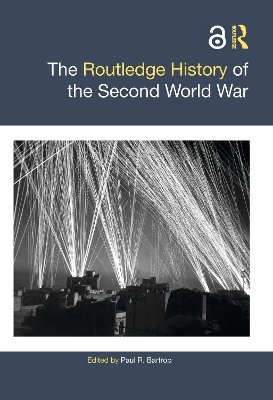
The Routledge History of the Second World War
Routledge (Verlag)
978-1-138-31708-6 (ISBN)
The Routledge History of the Second World War sums up the latest trends in the scholarship of that conflict, covering a range of major themes and issues.
The book delivers a thematic analysis of the many ways in which study of the Second World War can take place, considering international, transnational, and global approaches, and serves as a major jumping off point for further research into the specific fields covered by each of the expert authors. It demonstrates the global and total nature of the Second World War, giving due coverage to the conflict in all major theatres and through the lens of the key combatants and neutrals, examines issues of race, gender, ideology, and society during the war, and functions as a textbook to educate students as to the trends that have taken place in how the conflict has been (and can be) interpreted in the modern world. Divided into twelve parts that cover central themes of the conflict, including theatres of war, leadership, societies, occupation, secrecy and legacies, it enables those with no memory of war to approach it with a view to comprehending what it was all about and places the history of this conflict into a context that is international, transnational, and institutional.
This is a comprehensive and accessible reference volume for anyone interested in the most up to date scholarship on this major conflict.
Chapter 18 of this book is freely available as a downloadable Open Access PDF under a Creative Commons Attribution-Non Commercial-No Derivatives 4.0 license available at http://www.taylorfrancis.com
Paul R. Bartrop is Professor Emeritus of History at Florida Gulf Coast University, USA, and Honorary Principal Fellow, University of Melbourne. He is the author, editor, or co-editor of over 25 books relating to the Holocaust, genocide, and the Second World War.
Part 1: Outbreaks: War to World War 1. Avoiding War? British Diplomacy and the Outbreak of War in 1939 2. Planning Armageddon: Operation Barbarossa 3. The Origins of the War in the Pacific: 1937-1941 Part 2: Perspectives: Tradition and Change 4. Nationalism, Identity, and Race in the Second World War 5. A Transnational Perspective of Women on the Home Front Part 3: Theatres: Fighting the War 6. The European War: An Overview 7. War of Great Distances: Allied Strategy in the Pacific War, 1941-1945 8. The Crucial Phase of the China Theatre: The War of Resistance against Japan, 1937-1938 9. The Battle for North Africa 10. The War at Sea, 1939-1945 11. War in the Third Dimension: The Exercise of Air Power in the Second World War Part 4: Leadership: Directing the War 12. Directing the War from Triumph to Disaster: The German and Italian Cases 13. Churchill and Roosevelt as War Leaders 14. Japanese Leadership in the Second World War 15. Was Stalin Necessary? Soviet Command in the Great Patriotic War Part 5: Societies: Within the Combat Zone 16. Conservatism, Radicalism and Global Conflict: Britain’s War, 1939-1945 17. Germany at War 18. Japanese Society at War: History and Memory 19. Italian Society during World War II 20. Poles under German and Soviet Occupations 21. France at War: A Country Divided or a Society United? 22. Stalin’s War or People’s War? Total War behind the Front Lines 23. China Divided and at War, 1937-1945 Part 6: Societies: Beyond the Combat Zone 24. America at War 25. Canada: Limited Liability and Total War 26. Australia and the Second World War 27. A Conscripted Society: Sustaining New Zealand’s War Effort 28. South Asia in World War II 29. Brazil at War: An Unexpected, but Necessary, Ally 30. Mexico: In the Shadow of World War II Part 7: Occupation: Compliance and Resistance 31. Western Europe under Occupation 32. Collaboration and Resistance in the East: Explaining a Contested Past 33. Armies of Collaboration and Resistance in Southeast Asia Part 8: Surviving: Remaining Neutral 34. Switzerland as a Neutral State during the Second World War 35. Sweden: An Ambiguous Participant 36. Not Neutral: Spain and the Second World War 37. Apolitical Arbiter? The Vatican as a Neutral during the Second World War Part 9: Secrecy: The Clandestine War 38. Uncovering Secrets: Spies, Double Agents, and Codebreakers 39. Australasian Special Operations in the Second World War Part 10: Inhumanity: Savagery and Mass Murder 40. Crimes against Humanity 41. German Violations of the Law of War 42. The Second World War as a Genocidal Conflict Part 11: Endings: Downfall and Victory 43. East-Central Europe: From Nazi Rule to Communism, 1943-1948 44. War and Destruction in Western Europe: Picking up the Pieces 45. Sideshow or Pandora’s Box? Ending the Pacific War in Southeast Asia, 1945 46. The Quest for Justice in the Aftermath of the War Part 12: Legacies: Memory and History 47. Remembering and Forgetting the War 48. The Second World War in Global History
| Erscheinungsdatum | 10.11.2021 |
|---|---|
| Reihe/Serie | Routledge Histories |
| Verlagsort | London |
| Sprache | englisch |
| Maße | 174 x 246 mm |
| Gewicht | 1760 g |
| Themenwelt | Geschichte ► Allgemeine Geschichte ► 1918 bis 1945 |
| Geschichte ► Teilgebiete der Geschichte ► Militärgeschichte | |
| ISBN-10 | 1-138-31708-X / 113831708X |
| ISBN-13 | 978-1-138-31708-6 / 9781138317086 |
| Zustand | Neuware |
| Haben Sie eine Frage zum Produkt? |
aus dem Bereich


